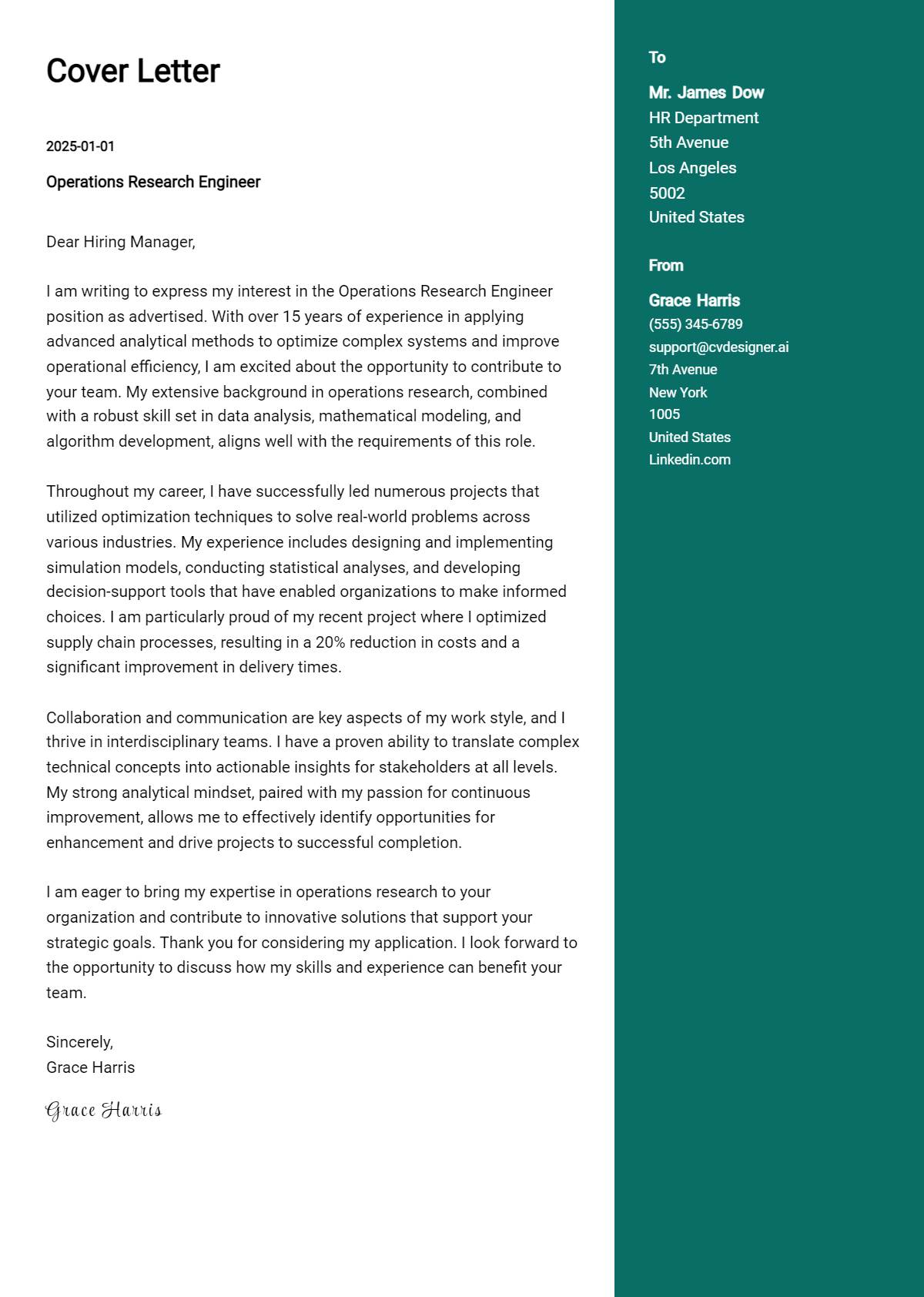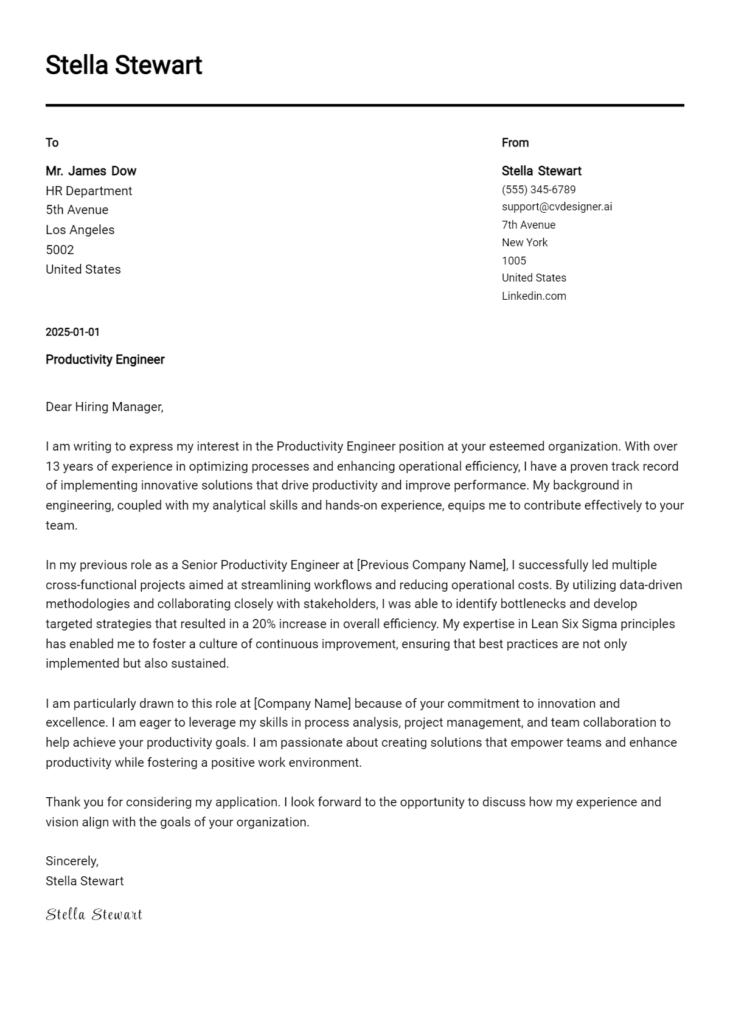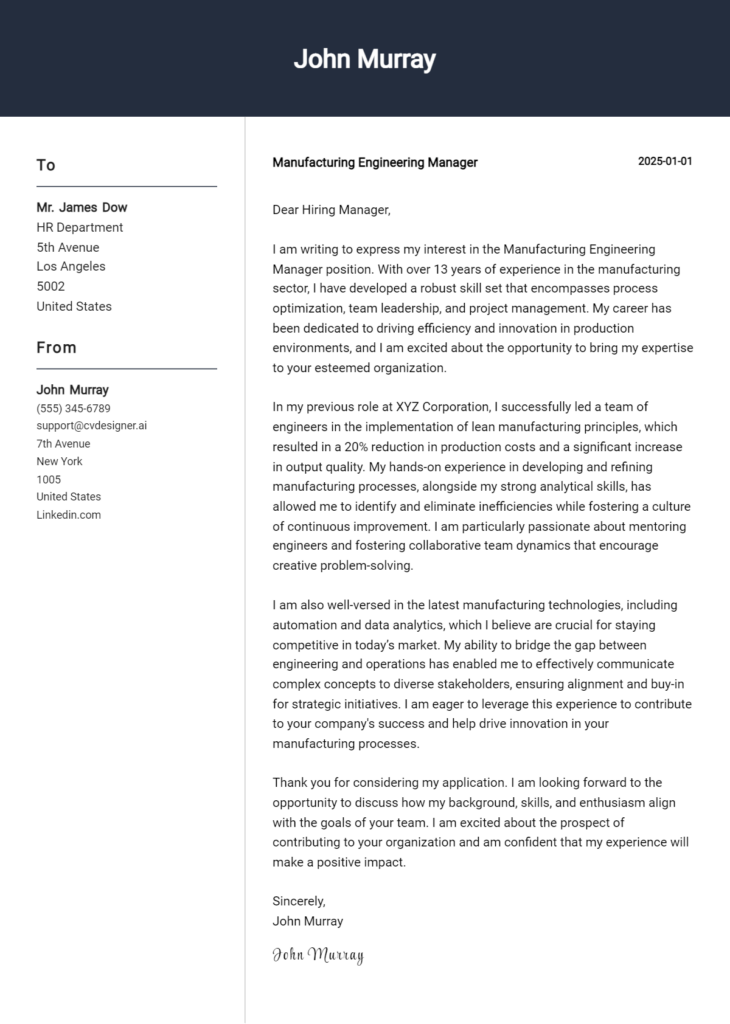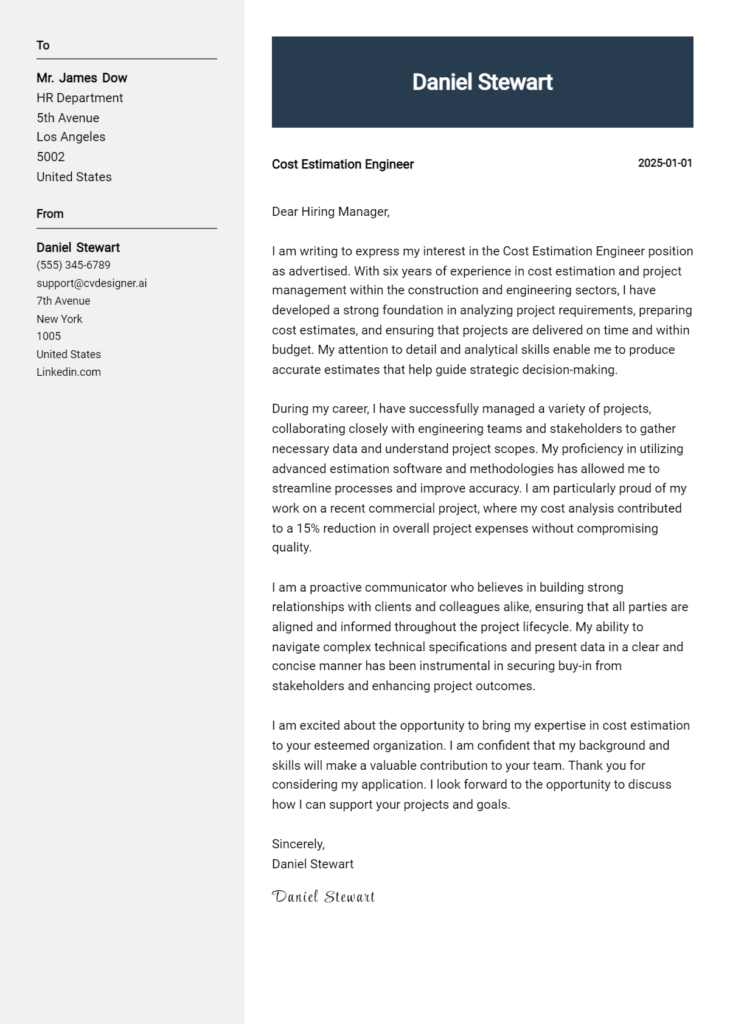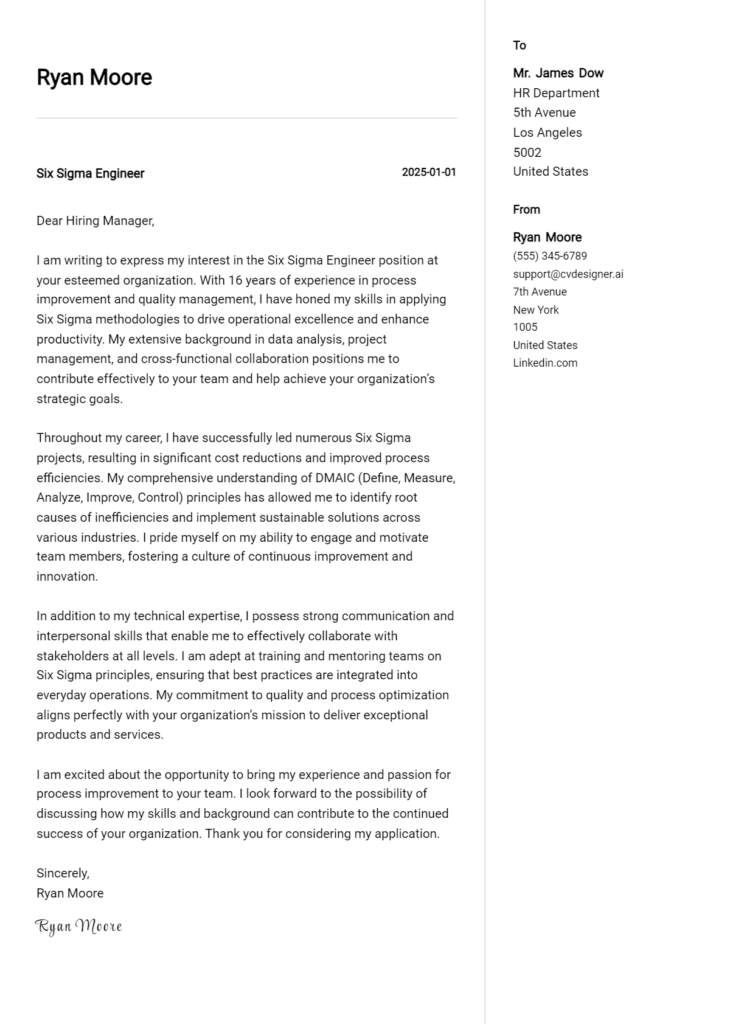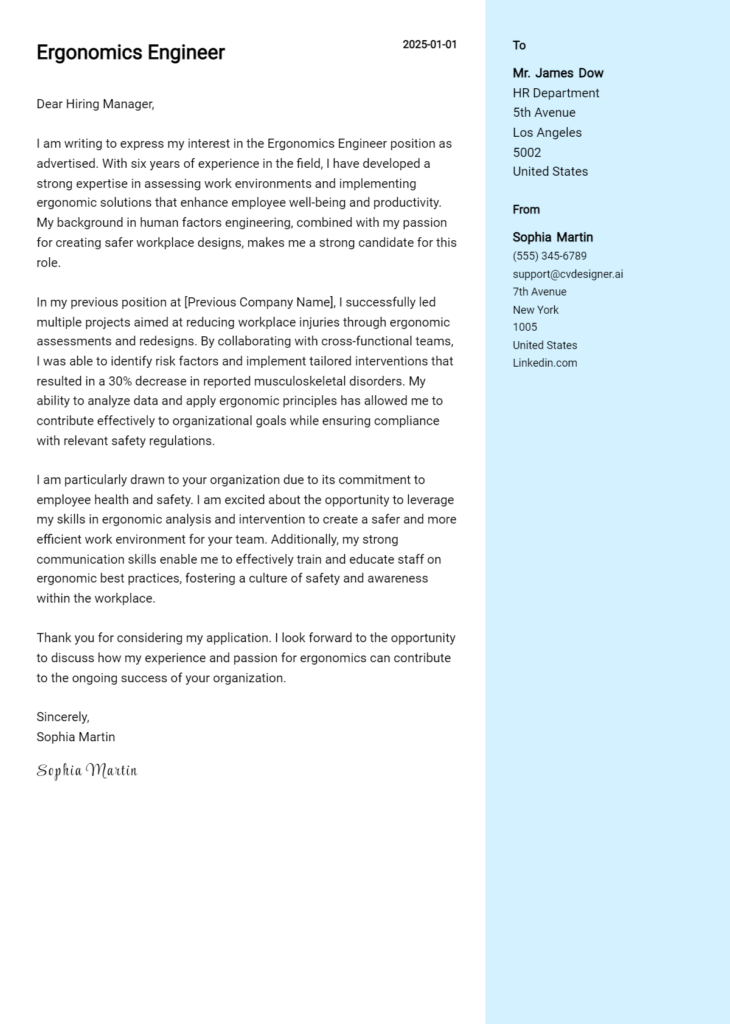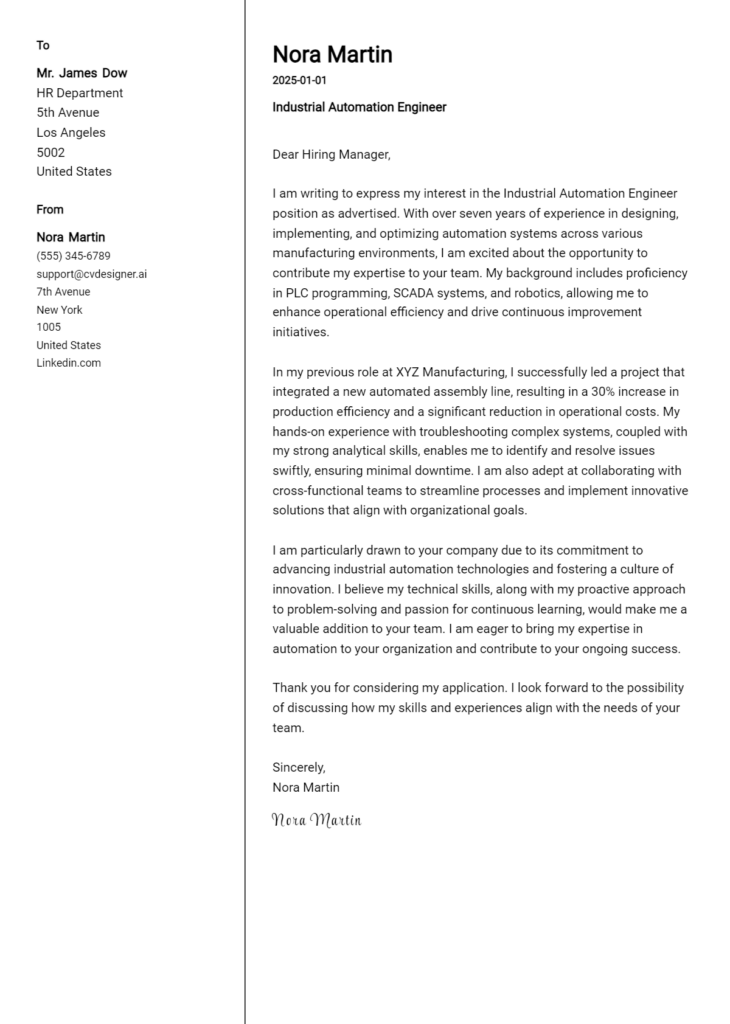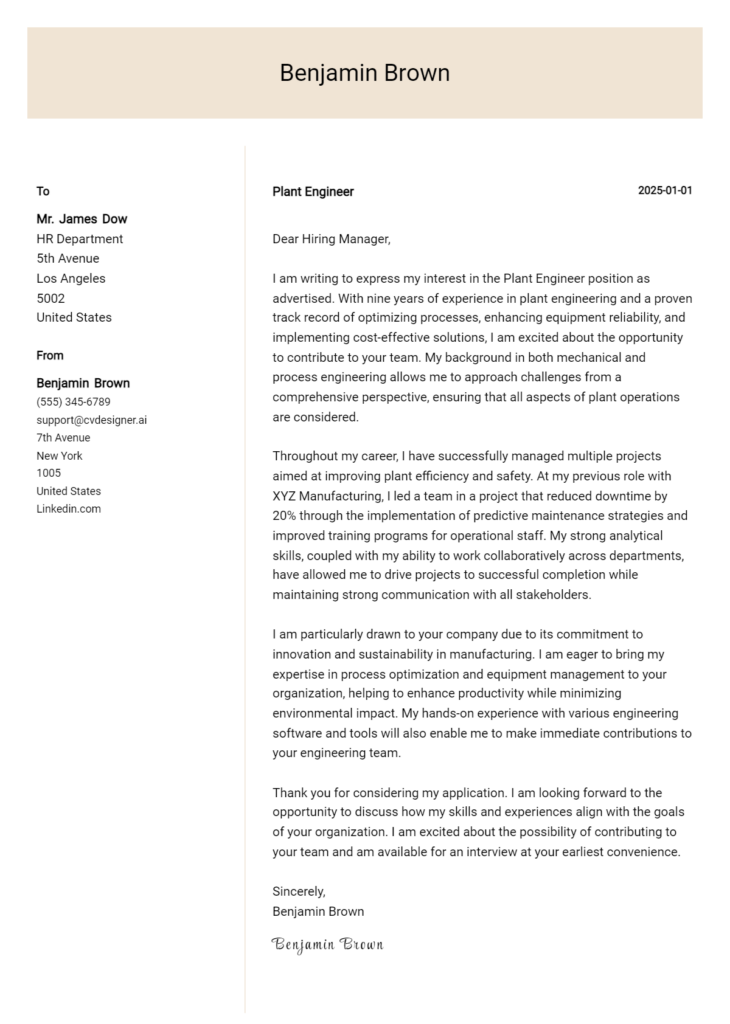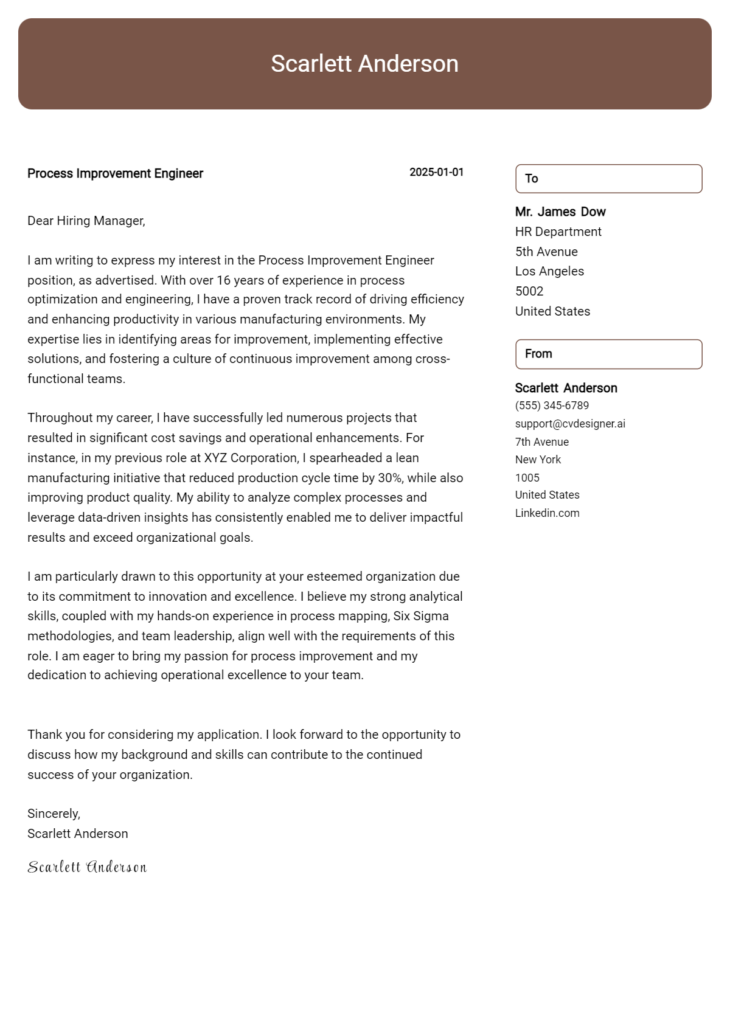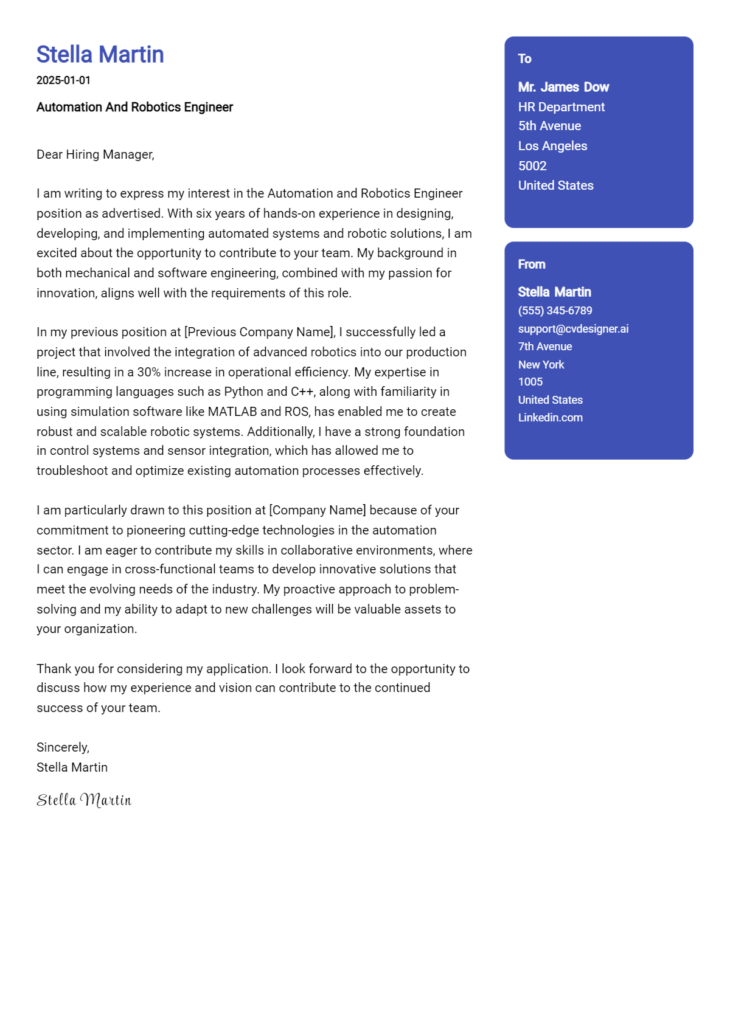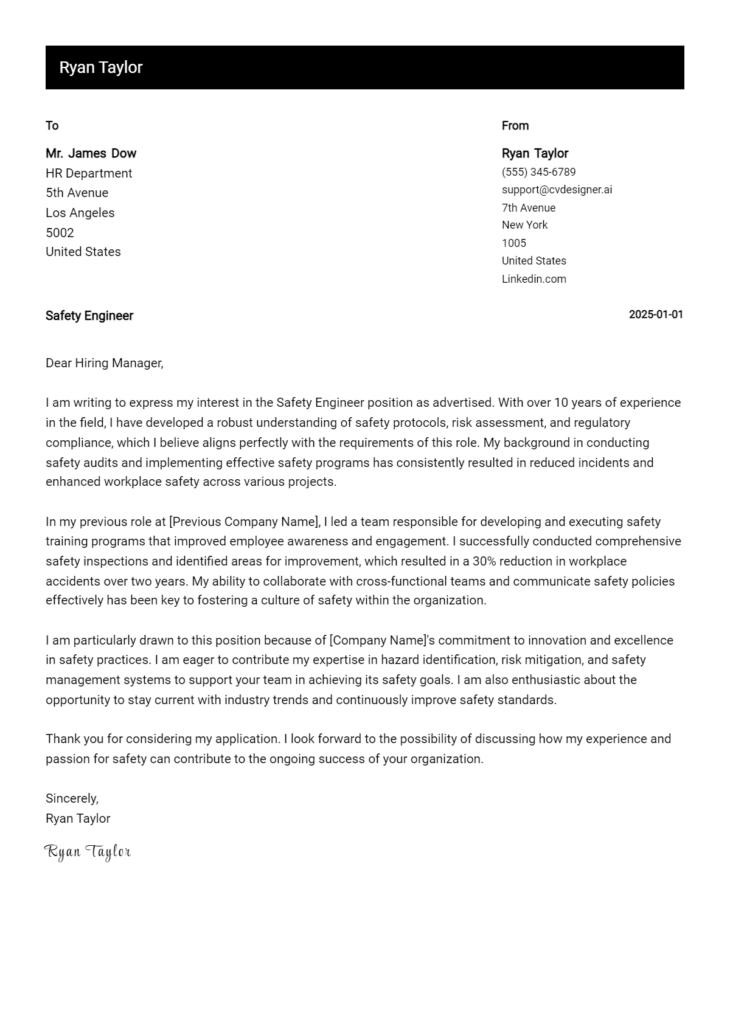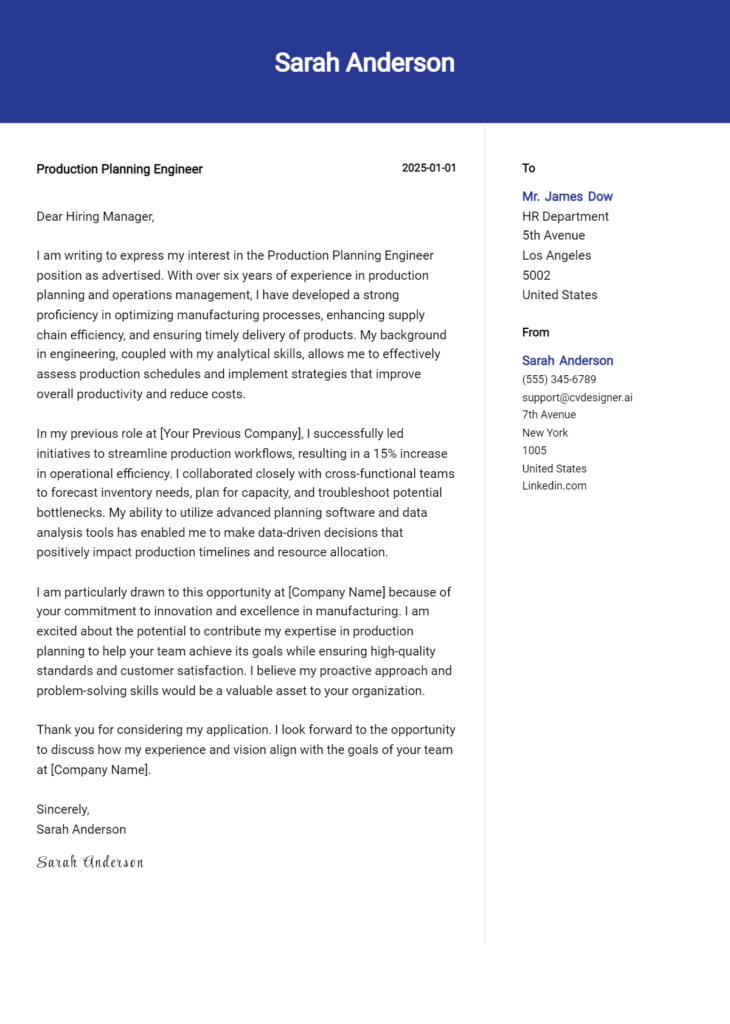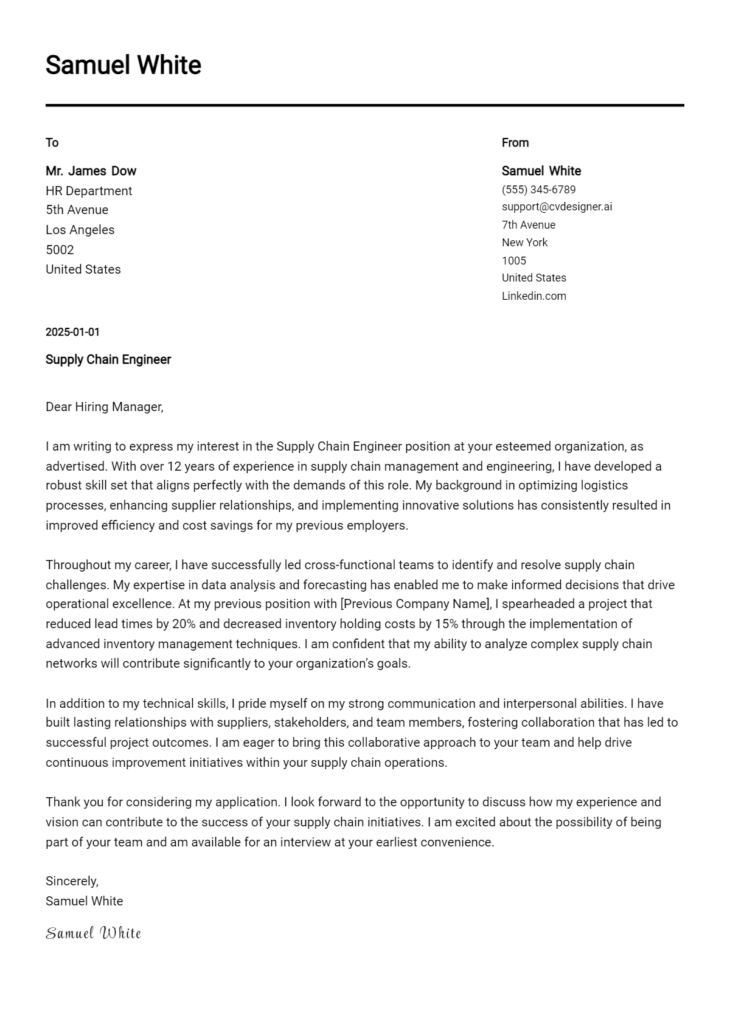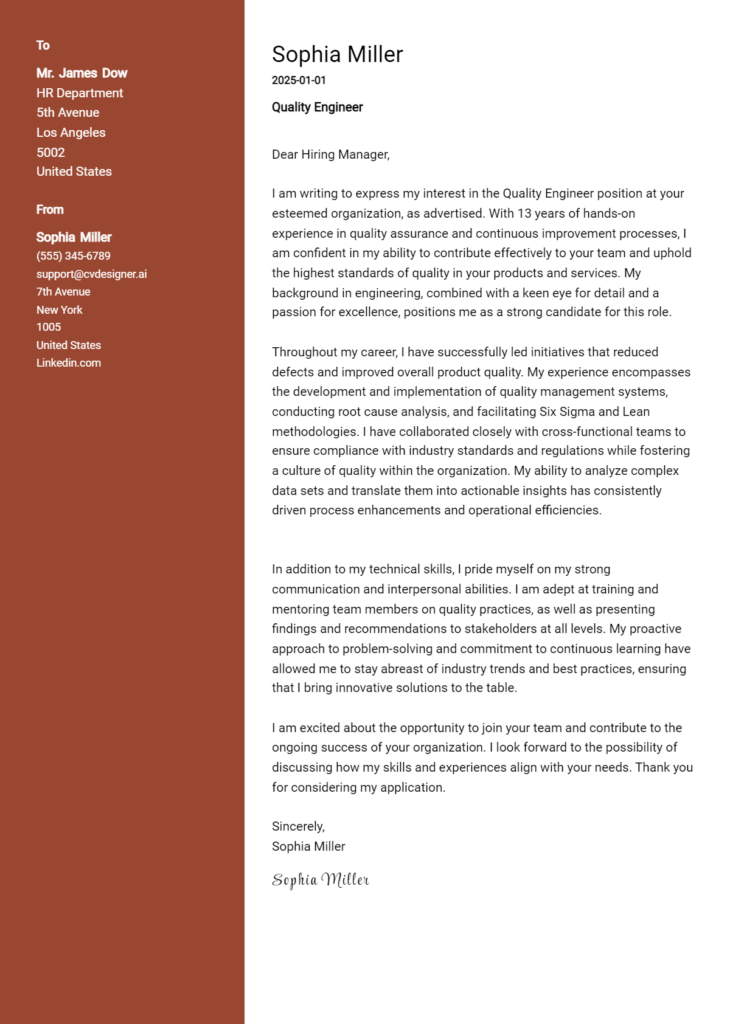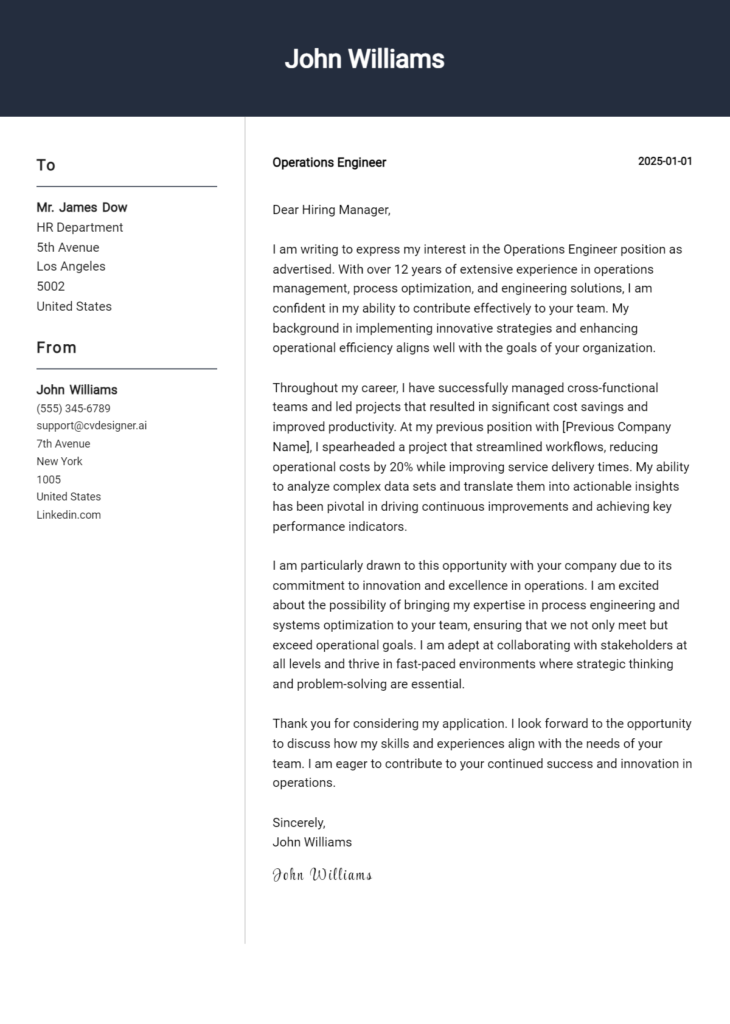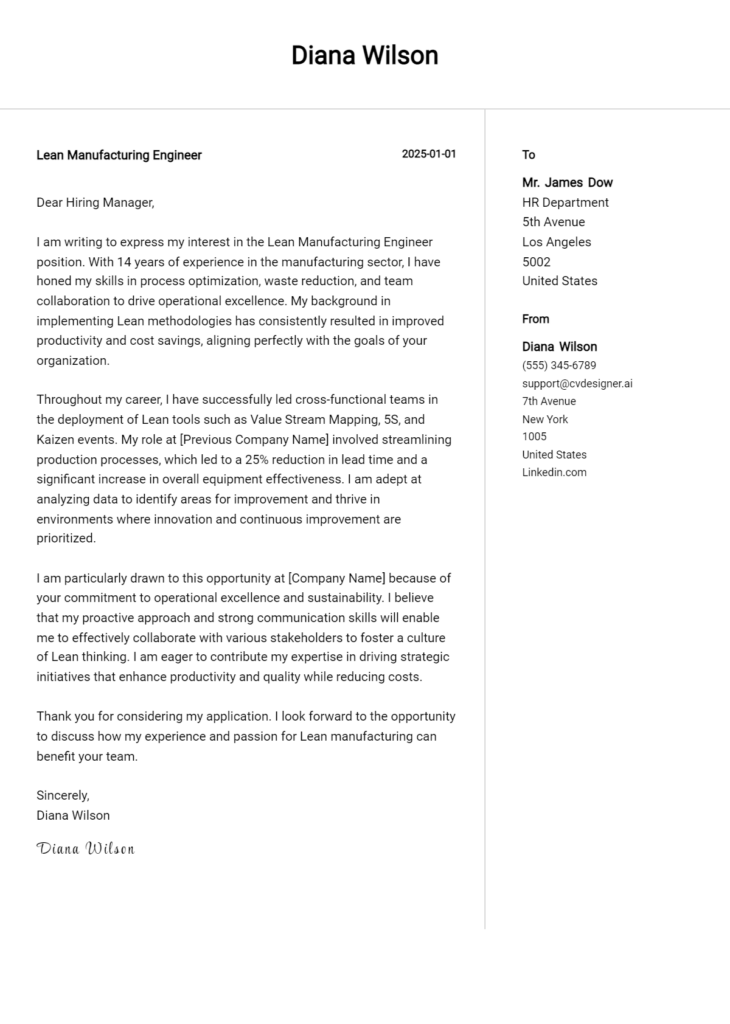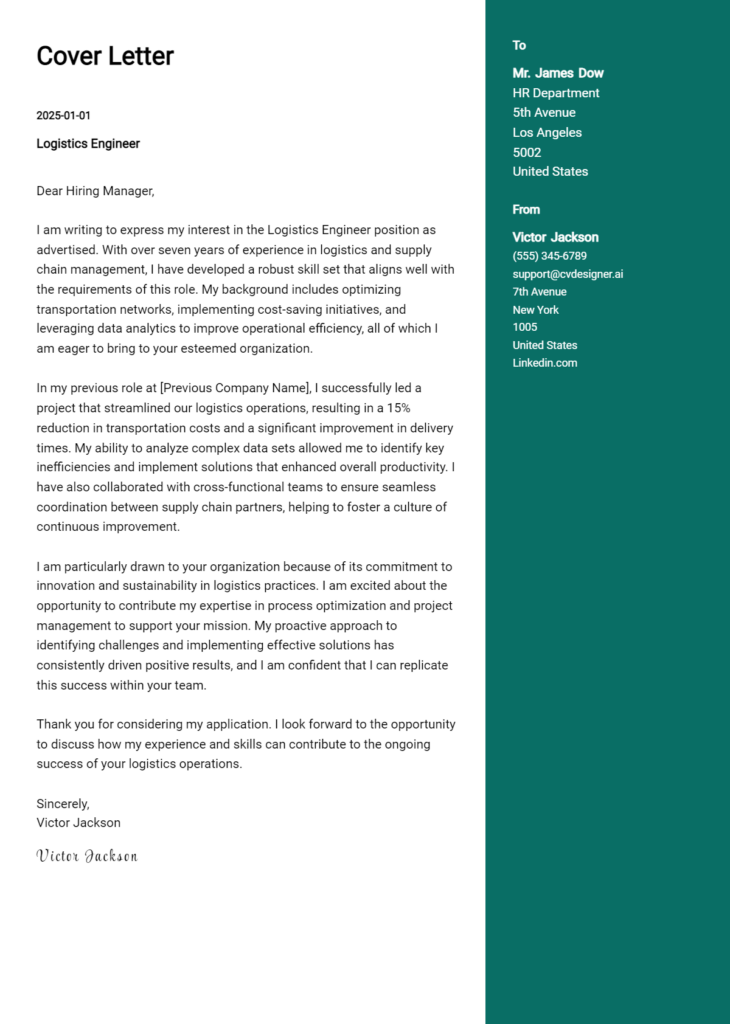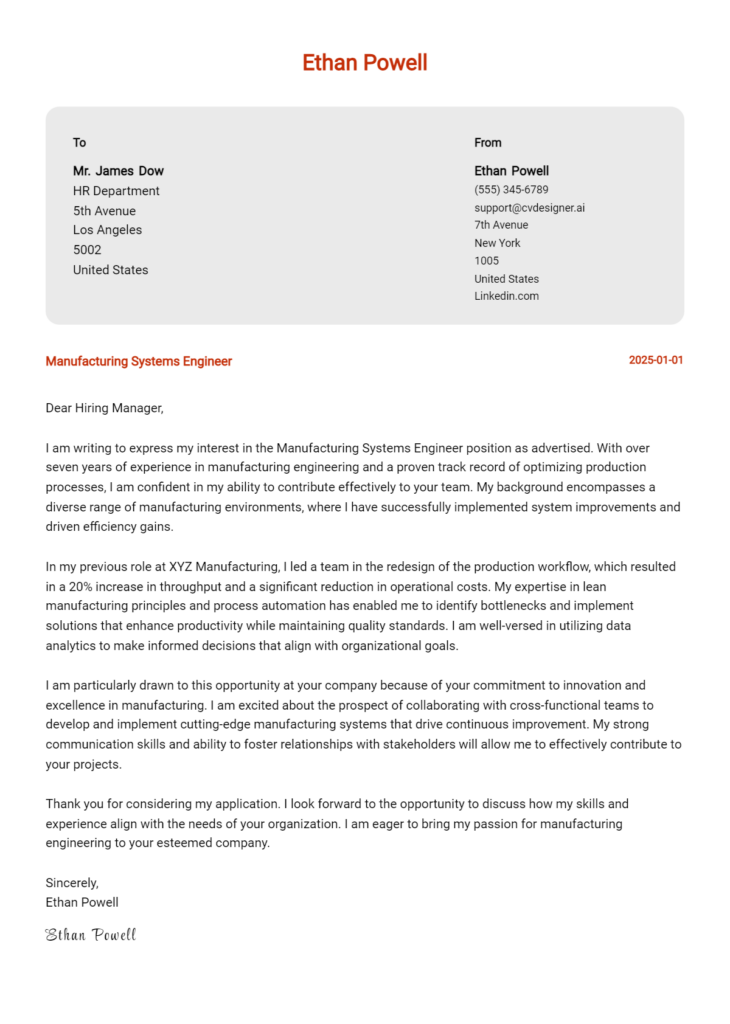Operations Research Engineer Cover Letter Examples
Explore additional Operations Research Engineer cover letter samples and guides and see what works for your level of experience or role.
How to Format a Operations Research Engineer Cover Letter?
Crafting a compelling cover letter is crucial for an Operations Research Engineer, as it not only showcases your technical skills but also demonstrates your problem-solving abilities and analytical thinking. Proper formatting reflects your professionalism and attention to detail—traits that are essential in the field of operations research. A well-structured cover letter can grab the hiring manager's attention and effectively communicate your qualifications for the role.
In this guide, we'll explore how to format your cover letter effectively, providing insights and industry-specific examples to help you create an engaging document.
We'll focus on the essential components of a professional cover letter, including:
- Cover Letter Header
- Cover Letter Greeting
- Cover Letter Introduction
- Cover Letter Body
- Cover Letter Closing
Each section plays a vital role in presenting your qualifications and professionalism. Let’s break down each part and explain how to make your Operations Research Engineer cover letter shine.
Importance of the Cover Letter Header for an Operations Research Engineer
The cover letter header is a crucial component of your application as an Operations Research Engineer, as it sets the tone for professionalism and clarity right from the start. A well-structured header not only provides essential contact information but also establishes your identity and intent. It should typically include your name, address, phone number, email, the date, and the recipient's name and title, along with their company and address. This information is essential for ensuring that your cover letter reaches the right individual and conveys your seriousness about the position.
A strong header reflects attention to detail and organization, qualities that are highly valued in operations research roles. Conversely, a poorly formatted header can detract from the overall impression you make, potentially undermining your qualifications. Here are examples of a strong and weak cover letter header:
Strong Example:
John Doe 1234 Elm Street Springfield, IL 62701 (123) 456-7890 john.doe@email.com March 1, 2023 Jane Smith Hiring Manager XYZ Corporation 5678 Oak Avenue Springfield, IL 62702
Weak Example:
john doe 1234 elm st springfield jdoe@email March 1 2023 XYZ Corp
By following the guidelines for a professional header, you can enhance the effectiveness of your cover letter and make a positive impression on potential employers.
The Importance of the Cover Letter Greeting
The greeting in a cover letter serves as a crucial first impression and sets the tone for the entire document. A well-crafted greeting demonstrates professionalism and shows that you have taken the time to personalize your application by addressing the hiring manager directly. By avoiding generic salutations and making an effort to research the recipient's name, you convey your genuine interest in the position and the organization. A personalized greeting can help establish a connection with the reader, making them more likely to engage with the rest of your letter.
When crafting your greeting, consider the following tips:
- Avoid using "To Whom It May Concern" or "Dear Hiring Manager," as these can come off as impersonal.
- If the job listing does not provide a name, check the company's website or LinkedIn to find the appropriate contact.
- If you cannot find a specific name, consider using a title (e.g., "Dear Operations Research Team").
Strong Greeting Example
Dear Dr. Smith,
Weak Greeting Example
To Whom It May Concern,
The Importance of a Strong Cover Letter Introduction for an Operations Research Engineer
A well-crafted cover letter introduction is crucial for an Operations Research Engineer as it sets the tone for the entire application. This opening paragraph must effectively capture the hiring manager's attention, express genuine interest in the role, and briefly highlight the candidate's key skills or achievements relevant to the position. A strong introduction can create a lasting first impression, making the candidate stand out in a competitive job market. Conversely, a weak introduction may fail to engage the reader, potentially leading to the application being overlooked. Below are examples illustrating the difference between a strong and a weak introduction.
Strong Example
Dear [Hiring Manager's Name], I am excited to apply for the Operations Research Engineer position at [Company Name]. With a Master’s degree in Operations Research and over five years of experience in optimizing complex systems, I have successfully implemented data-driven strategies that increased operational efficiency by 30% at my previous company. I am eager to bring my analytical skills and passion for problem-solving to your innovative team, helping [Company Name] navigate its next set of challenges.
Weak Example
To Whom It May Concern, I am applying for the Operations Research Engineer job. I have some experience in this field and hope to do well. I think I could be a good fit for the role, as I have worked in various jobs related to operations.
Purpose of the Cover Letter Body for an Operations Research Engineer
The body of a cover letter for an Operations Research Engineer serves as a critical platform for candidates to present their technical skills, relevant experiences, and how these align with the needs of the company. It is an opportunity to illustrate specific projects or accomplishments that demonstrate the candidate's capacity to optimize processes, solve complex problems, and contribute to the organization's success. By effectively communicating their value proposition, candidates can distinguish themselves from other applicants and show how their unique background makes them a perfect fit for the role.
Strong Example
As an Operations Research Engineer at XYZ Corporation, I successfully led a project aimed at reducing supply chain costs by 15% over a six-month period. By employing advanced optimization techniques and simulations, I identified key inefficiencies in our logistics network and implemented actionable solutions. Additionally, I developed a predictive analytics model that improved forecast accuracy by 20%, allowing the company to better allocate resources and reduce waste. My ability to collaborate with cross-functional teams and communicate complex findings to stakeholders has consistently resulted in successful project outcomes, making me confident in my ability to bring similar results to your organization.
Weak Example
I have a degree in operations research and have done some work in optimization. I think I would be a good fit for your company because I like solving problems. I have been part of a few projects, but I can't remember all the details. I am good at math and can use software tools for analysis. I hope to bring my skills to your team.
Importance of the Cover Letter Closing for an Operations Research Engineer
The closing paragraph of a cover letter is crucial as it provides a final opportunity to summarize qualifications, express enthusiasm for the role, and encourage the hiring manager to take action, such as reviewing the resume or scheduling an interview. A strong closing effectively reinforces the applicant's fit for the position and leaves a positive impression. Conversely, a weak closing may come across as indifferent, failing to highlight the candidate's excitement or suitability, ultimately diminishing the impact of the entire letter.
Strong Example
Thank you for considering my application for the Operations Research Engineer position at [Company Name]. With my strong analytical skills, expertise in optimization techniques, and a passion for solving complex problems, I am excited about the opportunity to contribute to your team. I look forward to the possibility of discussing how my background and vision align with the goals of [Company Name]. Please feel free to review my resume, and I would welcome the chance to speak with you in an interview at your earliest convenience.
Weak Example
I hope you find my resume interesting. I think I could be a good fit for the Operations Research Engineer role, but I understand you have many candidates to consider. Let me know if you have any questions.
These tips will assist candidates in crafting an effective cover letter for the role of an Operations Research Engineer. A well-structured cover letter can be a decisive factor in standing out to potential employers. It's essential to highlight your technical skills, problem-solving abilities, knowledge of the Software Development Life Cycle (SDLC), teamwork experience, and a passion for continuous learning. By emphasizing these qualities, you can demonstrate your readiness to tackle complex challenges and contribute to the success of the organization.
Tips for Writing an Effective Cover Letter for Operations Research Engineer
Showcase Your Technical Skills
Clearly articulate your technical proficiencies relevant to operations research, such as optimization algorithms, statistical analysis, and simulation modeling. Be specific about the programming languages and tools you are adept in, like Python, R, or MATLAB. This helps demonstrate your capability to handle the technical demands of the role.Highlight Problem-Solving Abilities
Operations Research Engineers are often tasked with solving complex problems. Share specific examples from your previous experiences where you successfully identified issues and developed effective solutions. Quantify your achievements where possible—such as improving operational efficiency by a certain percentage—to showcase the impact of your contributions.Demonstrate Knowledge of SDLC
Understanding the Software Development Life Cycle is crucial for an Operations Research Engineer. In your cover letter, mention any relevant experience you have in the various stages of SDLC, particularly in how you've applied operations research principles to enhance software development processes or project outcomes.Emphasize Teamwork and Collaboration
The ability to work well within a team is vital in any engineering role. Discuss your experience collaborating with cross-functional teams, such as data scientists, software engineers, and business analysts. Highlight how your contributions fostered a cooperative environment and led to successful project completions.Express a Passion for Continuous Learning
The field of operations research is constantly evolving, with new methodologies and technologies emerging regularly. Convey your commitment to continuous learning by mentioning any relevant certifications, courses, or professional development activities you have pursued. This showcases your proactive approach to staying updated and improving your skills.
For more resources on crafting your cover letter, consider exploring cover letter templates or using a cover letter builder to streamline the process.
Common Mistakes to Avoid in a Operations Research Engineer Cover Letter
Avoiding common mistakes in your cover letter is crucial for standing out in the competitive field of operations research engineering. A well-crafted cover letter can make a significant difference in showcasing your skills and experience to potential employers. Here are some common pitfalls to avoid:
Generic Content: Using a one-size-fits-all approach can make your cover letter forgettable. Tailor your letter to the specific job and company by mentioning relevant projects or skills.
Ignoring the Job Description: Failing to align your qualifications with the job requirements may lead hiring managers to overlook your application. Carefully read the job description and highlight how your experience meets those needs.
Lack of Specific Examples: Vague statements without supporting evidence can weaken your case. Use specific examples from your previous work that demonstrate your problem-solving capabilities and analytical skills.
Poor Structure and Formatting: A cluttered or unprofessional format can distract from your message. Ensure your cover letter follows a clean and organized cover letter format to enhance readability.
Neglecting to Proofread: Spelling and grammatical errors can create a negative impression. Always proofread your letter or ask someone else to review it for clarity and correctness.
Overemphasizing Technical Jargon: While it's essential to demonstrate your technical knowledge, using too much jargon can alienate readers. Balance technical terms with clear explanations that showcase your understanding.
Failing to Show Enthusiasm: A lack of enthusiasm can be detrimental to your application. Convey genuine interest in the role and the company to make a stronger connection with the reader.
To further enhance your cover letter, consider reviewing cover letter examples for inspiration and guidance on effective writing techniques.
Cover Letter FAQs for Operations Research Engineer
What should I include in my cover letter as an Operations Research Engineer?
In your cover letter, you should highlight your relevant skills and experiences that align with the job description. Start with a strong introduction, mentioning the position you’re applying for and where you found the listing. Discuss your educational background in operations research, mathematics, or a related field and any specific projects or internships that demonstrate your analytical and problem-solving skills. Be sure to mention any experience with optimization techniques, statistical analysis, or modeling software such as MATLAB, Python, or R. Finally, express your enthusiasm for the company and how your skills can contribute to their goals.
How can I make my cover letter stand out for an Operations Research Engineer role?
To make your cover letter stand out, personalize it for the specific role and company. Research the organization and incorporate relevant information about their projects or values that resonate with you. Use quantifiable achievements to showcase your impact in previous roles, such as how your analysis improved efficiency or reduced costs. Additionally, employing industry-specific terminology can demonstrate your expertise. A strong closing statement that reiterates your excitement about the opportunity and invites further discussion can also leave a lasting impression.
Should I address my cover letter to a specific person?
Whenever possible, addressing your cover letter to a specific person, such as the hiring manager, can make a significant difference. It shows that you have taken the time to research the company and are genuinely interested in the position. If the job listing does not provide a name, check the company’s website or LinkedIn for potential contacts. If you still cannot find a specific individual, using a general greeting like "Dear Hiring Team" is acceptable, but a personalized greeting is always preferable.
How long should my cover letter be for an Operations Research Engineer position?
Your cover letter should ideally be one page long, roughly 3-4 paragraphs. Keep it concise and focused, ensuring that each sentence adds value to your application. Start with an engaging introduction, followed by a few paragraphs detailing your relevant experience and skills, and conclude with a strong closing statement. Aim for clarity and brevity, using bullet points if necessary to highlight key achievements or skills. This approach allows you to communicate your qualifications effectively while respecting the hiring manager’s time.
Build your Cover Letter in minutes
Use an AI-powered cover letter builder and have your letter done in 5 minutes. Just select your template and our software will guide you through the process.

